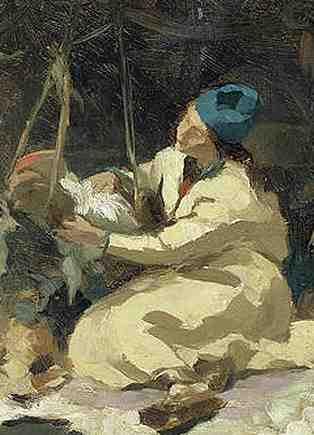Fedor Sologub's reputation is rather mixed. Mirsky calls him the greatest and most refined of the first generation of Symbolists, and remarks that, however much his novelist powers may have waned in later years, his poetic output always remained on the same high level. His meters were simple and ordinary, but refined to the utmost degree of perfection. His vocabulary was small, but used with precision and felicity. He was a Symbolist in the sense that his words had double meanings, and the words were used in that secondary meaning, not in the ordinary sense. {1}

Mirsky goes on to say that 'As for his idealistic lyrics, which, after all, are his greatest achievements, it is useless,
except one be a master of English verse, to attempt any translation on them.{1} Against that, the editors of The Penguin Book of Russian Verse
give only one short extract of one poem: My Boring Lamp. {2}
Тихая колыбельная
Много бегал мальчик мой.
Ножки голые в пыли.
Ножки милые помой.
Моя ножки, задремли.
Я спою тебе, спою:
«Баю-баюшки-баю».
Тихо стукнул в двери сон.
Я шепнула: «Сон, войди».
Волоса его, как лён,
Ручки дремлют на груди, —
И тихонько я пою:
«Баю-баюшки-баю».
«Сон, ты где был?» — «За горой». —
«Что ты видел?» — «Лунный свет». —
«С кем ты был?» — «С моей сестрой». —
«А сестра пришла к нам?» — «Нет».
Я тихонечко пою.
«Баю-баюшки-баю».
Дремлет бледная луна.
Тихо в поле и в саду.
Кто-то ходит у окна,
Кто-то шепчет: «Я приду».
Я тихохонько пою:
«Баю-баюшки-баю».
Кто-то шепчет у окна,
Точно ветки шелестят:
«Тяжело мне. Я больна.
Помоги мне, милый брат».
Тихо-тихо я пою:
«Баю-баюшки-баю».
«Я косила целый день.
Я устала. Я больна».
За окном шатнулась тень.
Притаилась у окна.
Я пою, пою, пою:
«Баю-баюшки-баю».
October 19, 1906
The TTS Audio Recording is:
The poem is written in tetrameters, all with masculine rhymes: ababcc:
Мно́го бе́гал ма́льчик мой. 4a
Но́жки го́лые в пыли́. 4b
Но́жки ми́лые помо́й. 4a
Моя́ но́жки, задремли́. 4b
Я спо́ю|спою́ тебе́, спою́: 4c
«Баю-баюшки-баю́». 4c
Ruverses has a rendering by R.M. Hewitt. First stanza:
Running barefoot all the day,
Time for him to go to bed.
We must wash the dust away,
While he droops his little head.
I will sing, and all for you,
Bayú-bayushkl-bayú.
And there's another, a little closer to the Russian but less musical, in the large anthology edited by Markov and Sparks. {2}
Baby, you've run such a lot,
see the dust on your bare feet.
Go and wash them, every spot.
while you do that, doze, my sweet,
I will sing, I'll sing for you:
Bi-Yoo, BiYooshky, Bi-You.
Lullabies are popular in Russian poetry. Though often seen as pretty little trifles, they can be fiendishly hard to get right, i.e.
with believable diction, natural rhymes and simple musicality. That is the case with both of the previous translations, which
will be the best available to the editors over the last century: a sobering thought.
Taking the versions in turn, the first is clearly the most musical, an important consideration, but has lines like 'Hair of flax and hand of wax. / Not the little chimney-sweep,'
which are hardly sanctioned by the original Russian. It also drops the full rhyming in stanzas 2, 3, 4 and 6. The second rendering is fully rhymed, but is
marred by tone lapses ('such a lot') and unfortunate rhymes ('every spot'). The metre is also rather uncertain, and we have things like (stanza 2), 'soft raps' rhyming with the cumbersome 'His hair does resemble flax'.
And so on. I mention these matters to answer the unspoken question: why more Russian poetry translations? Because they're needed. Even back in the 1960s, when verse craft was still an important
aspect of contemporary poetry, matters vital to translation were being neglected. (And the Markov and Sparks anthology won the $1000 p.e.n award, incidentally.) If we can't create a translation
that pleases in the way the original pleases, then we are failing on the aesthetics side. Far more serious is the absence of poetry in the translations today: we don't want Lowell's
'Imitations', but we do need translations we can repeatedly turn to for pleasure. I've departed a little from the original to bring out what's latent in the text.
Lullaby
Running carefree through the day,
you who have no pants to shed:
Look: I'll brush the dirt away
the while you rest your pretty head.
Sleep, sleep: I'll sing to you.
"Sleep, my little one: bayu."
A knocking quietly on the door:
And so I whispered, "Sleep, come in."
Flax the little curls I saw,
about his chest his hands had been.
Softly I will sing to you
"Sleep, my little one: bayu."
"Where were you dreaming?" — “On the hill.”
"What dreaming of?" — “The moonlight there.”
"Was my sister?" — "With you still."
"Did sister come?" — “No, that I swear.”
Softly I will sing to you
"Sleep, my little one: bayu."
The moon is in her dreamy reign,
which the fields and gardens share.
Someone's at the window pane;
someone's whispering, "I'll be there."
And so I sing and sing to you
"Sleep, my little one: bayu."
There's whispering at the window pane:
the twigs are crackling in the tree.
"I'm old and ill," the words complain.
Little brother, please help me."
Then softly I will sing to you
"Sleep, my little one: bayu."
"I've been mowing all the day;
I'm sick and tired and much in pain."
I see the shadow dart away
and hide beneath the window pane.
This I sing and sing to you,
"Sleep, my little one: bayu."
1. Mirsky, D.S, Contemporary Russian Literature (Alfred A Knopf, 1926) 196-201.
2. Chandler, R. et al. The Penguin Book of Russian POetry (Penguin Random House, 2015) 158.
3. Bristol, E., A History of Russian Poetry (1991, O.U.P.) 178-81.
4. Markov, V. and Sparks, M.L. (Eds.) Modern Russian Poetry (Bobbs-Merril & Co., 1967) 100-103.
Russian poem translations on this site: listing.